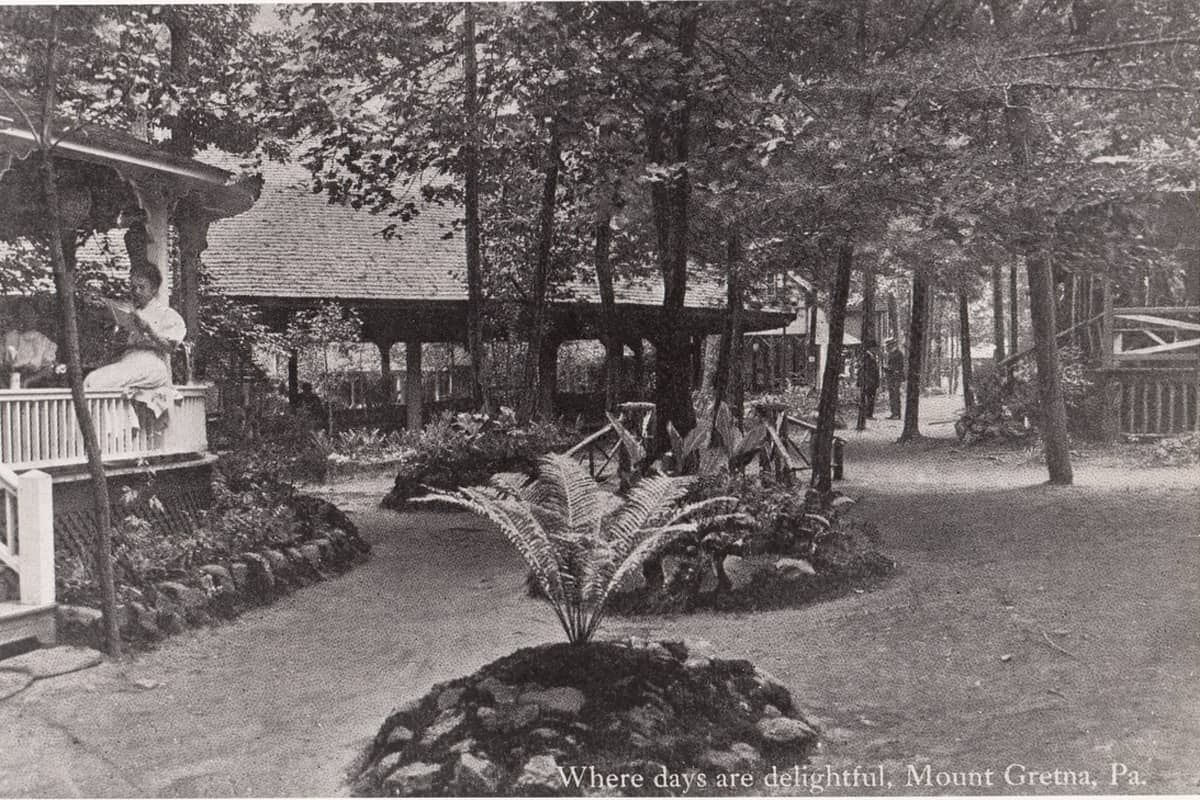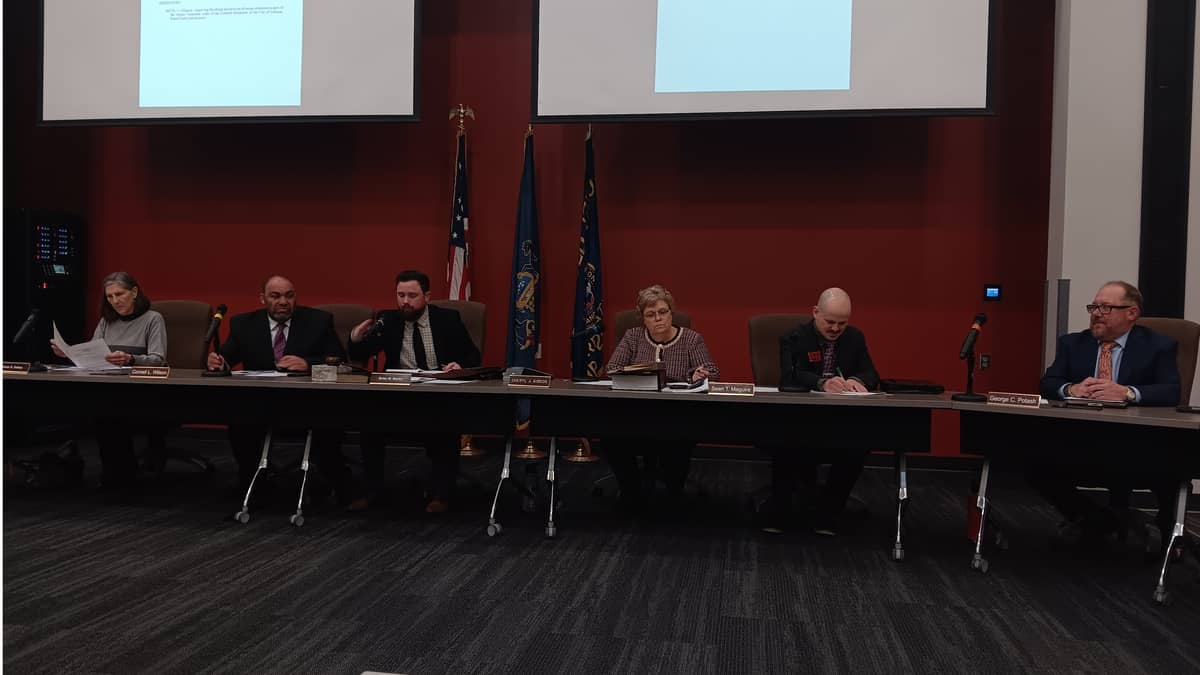The historical record on the building of the Mount Gretna Tabernacle is sketchy at best.
For the first seven years of campmeetings held in Mount Gretna, the religious services were held in a grove, and attendees had to weather wind and rain.
In 1898, the campmeeting board decided a structure was needed to provide shelter, and two members were authorized “to get plans or estimates for auditorium,” according to the minutes. It seems that, given the proximity of and similarity to the John Cilley-designed auditorium in nearby Chautauqua, the members contacted him.

Cilley apparently was hired in May 1899 as the board passed a motion to build an auditorium, according to the minutes, although Cilley wasn’t named, and a construction start date wasn’t mentioned.
But 10 weeks later, on Sunday, Aug. 6, dedicatory services of the campmeeting’s “handsome new auditorium” were held, according to the Aug. 7, 1899, Lebanon Daily News. There was no mention of Cilley nor of the construction.
Read More: Preserving the Past: Mount Gretna Tabernacle needs a new roof
“Ingenious” is how Jeff Steckbeck, president/CEO of Steckbeck Engineering & Surveying Inc., described the building. “When you look at the structural components, you have to wonder, how did he do it, how did he put it together?”

On Aug. 29, 1899, the campmeeting board minutes state “bills were accepted and an order drawn on the Treasury … John H. Cilley $1132.60 auditorium.” Unknown is whether that payment included materials and laborers.
Those bills also included payment to “Daniel Gelbach & Co. $167.77 Labor.” Information is missing about whether this was for the laborers on the Tabernacle or another project.
How to translate those amounts to 2023 dollars is hard to compute given that the Consumer Price Index wasn’t developed until 1913.
But the cost to replace Chautauqua’s auditorium that collapsed in 1994 allows for some comparison. That project had a price tag of about $750,000, said Carl Ellenberger, member of the Playhouse Rebuild Committee and founder of Gretna Music, in an email. Construction took 38 weeks — from the week after Labor Day to the week before Memorial Day 1995.

John Cilley designed buildings for generations
John H. CIlley, a self-taught 19th-century engineer, left a legacy of unique community auditoriums still in use today.
Notable are the iconic, open-sided auditoriums that he designed for the Mount Gretna Campmeeting in 1899 and the Mount Lebanon Campmeeting in 1904. Cilley’s first innovative auditorium was for the Pennsylvania Chautauqua in Mount Gretna, a structure that collapsed because of heavy snow in 1994.
In designing the auditoriums, Cilley drew on barn architecture and the Shakers’ preference for circular structures, said Bill Linton, a campmeeting cottage owner and retired professional engineer.
“The innovation was his use of a collector ring in the dome of the building to provide stability,” Linton said. “This ring enhanced the structural stability beyond that of a typical quadrilateral-shaped structure, resulted in cost savings as fewer building materials were required and removed view-obstructing center posts.”
Born in 1845 in Londonderry Township, CIlley was the youngest of five children born to Nicholas Cilley (his mother was not named in his April 13, 1916, obituary in the Lebanon Daily News). Before enlisting in the Union Army in 1862, he worked as a carpenter, an occupation he returned to after military service.
From 1866 to 1869, he did general contracting and “devoted his evenings to the study of geometry, mensuration and trigonometry, being his own teacher,” according to his obituary. (Mensuration is the application of mathematical principles to the measurement of geometric shapes.)
Using that knowledge, he then worked for Gassert & Light lumber company as a “geometrical stair builder,” according to the Lebanon Daily News.
Exactly what that involved wasn’t specified, but “it sounds like he was building a kind of free-form, continuous staircase using geometrical principles,” said William Barlow, a local architect. “This is very different than the typical rectangular or square stairs popular today.”
In 1875, Cilley started a general contracting business with George Gassert of the lumber company. After Gassert’s death in 1883, Cilley went solo, building a school at Seventh & Maple streets in Lebanon, as well as several churches.
It is uncertain whether Cilley served primarily as a contractor for those buildings or whether he also designed and engineered them. But he definitely designed the Pennsylvania Chautauqua’s auditorium as he was named the winner of the competition held for the structure built in the 1890s.
He used a similar design for four subsequent auditoriums, only two of which remain today — the one at the Mount Gretna Campmeeting and the other in Mount Lebanon Campmeeting. On a smaller scale, Cilley designed and built several cottages in the Chautauqua, one of which is adjacent to the playhouse. These are distinguished by their circular porches.
Questions about this story? Suggestions for a future LebTown article? Reach our newsroom using this contact form and we’ll do our best to get back to you.

Build the future of local news.
Cancel anytime.
Monthly Subscription
🌟 Annual Subscription
- Still no paywall!
- Fewer ads
- Exclusive events and emails
- All monthly benefits
- Most popular option
- Make a bigger impact
Already a member? Log in here to hide these messages
Our community deserves strong local news. LebTown delivers in-depth coverage that helps you navigate daily life—from school board decisions to public safety to local business openings. Join our supporters with a monthly or annual membership, or make a one-time contribution. Cancel anytime.

























